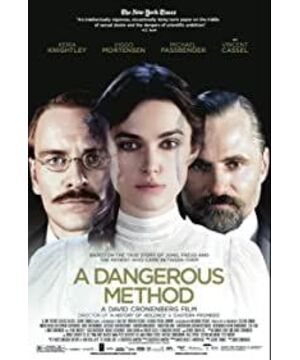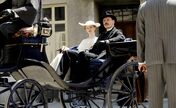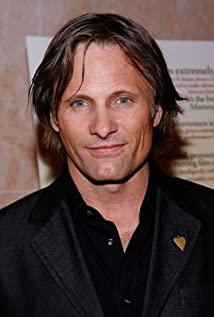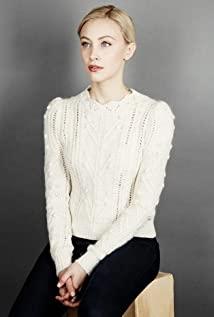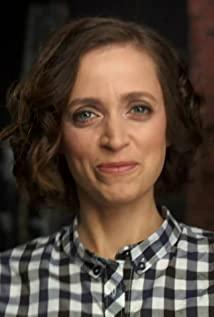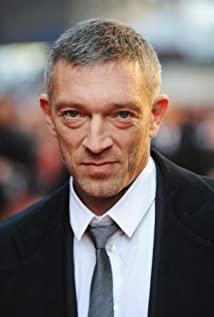Today I watched this long-awaited movie with my classmates. Several of us are philosophy students, but we are very interested in the psychoanalytic theories of Freud, Jung, and Lacan. I read Freud and Laplanche systematically for the first time this semester, so watching this movie feels like watching a detective film, full of details worth pondering. Although I am not a professional psychology student, I am still willing to throw out some of my ideas, hoping that more psychoanalysis friends can correct and discuss. In the film, when Freud and Jung's disagreement were getting bigger and bigger, Jung once wrote to ask Freud to face his neurosis and his desire to control others, and Freud wrote back. : "Every one of us is a little neurotic." It should be noted that in the following analysis, I discuss more about the characters in the movie and the typical meaning of the story in the movie, rather than the historical meaning. figure.
A Father and God—Freud’s Neurosis When
referring to Freud’s psychoanalysis, the first thing we think of is probably the Oedipus complex—a man’s affection for his mother and his father when he was a child. Repulsion, dramatized as the story of King Oedipus who killed his father and married his mother. In this story of male inevitable experience, the male self (ego, das Ich) is established. In his later works, Freud further proposed the superego (superego, das Über-Ich), the authoritative image of the father after men identified the father through the penis and from the gender perspective (in the middle-class family in Vienna in the late 19th century). Most of the fathers only appear at the dinner table every day, a detached and serious image. Freud admittedly relies too much on the special family relationship in this special society, but he also thinks that such a father image is opposed to it. The image of a loving mother is a prototype. Even children from single-parent families will find a spiritual substitute for the missing party) and become part of his spirit, representing authority, discipline, law, and punishment. For example, when I want to sleep late in the morning, the voice that commands me "You must get up! You have to get up to do your homework!" is my superego, and it comes from my identification with my father. (This example is not very good, because I am a woman. For Freud, women cannot be included in this Oedipus story, but let's use this example to make do with it.)
The film is full of different father relationships, Freud's fatherhood to Jung and to the entire psychoanalytic circle, Jung and his own children, as well as Sabina Spielling and the father she recalled.
The relationship between Jung and his children allows us to see the typical family in the late nineteenth and early twentieth centuries just mentioned. His children appeared in the film with their mother, and Jung did not even appear in the same scene with them.
The image of Freud's father was clear when he first appeared and welcomed Jung. He was old and established academically. During the debate, Jung was sometimes restless, while Freud was calm and composed, making Jung look like an impatient and rebellious adolescent child. Freud boldly exposed Jung, pointing out the symbol of the penis in his dream, and Jung could only smile at Freud’s own sexual predicament behind his back, in front of Otto Gross.
Freud’s insistence on psychoanalysis is a scientific discipline (he therefore insisted on limiting the problem domain of psychoanalysis to the theory of sex, instead of going to the collective subconsciousness shared by mankind, to the symbolism in mythology and literature like Jung did. And prototype), it strengthens this father-rational-law connection. This image reached its peak when he refused to tell Jung about his dream, and was thoroughly criticized at that moment. Freud was fully aware of his own and self-sustaining father image, and this desire to "I am afraid of losing my authority", as Jung said, undermined his authority.
(Although I will not discuss historical figures, I still want to insert a short paragraph. Freud in the film is very calm and stubborn. He is reluctant to his own theories, and he is a bit smug about the shocking world of his own theories. In fact, If you have read Freud, you will know that although he has never left sex and libido. This is the energy of life that has nothing to do with sex; Freud believes that Libydo must be related to sex], but his views have changed so much throughout his life that it is almost impossible to start. For example, he proposed only music Principle, and later questioned it; he proposed the unconscious and consciousness, but later proposed the structure of "self, id, and superego". These two structures can not completely correspond to each other, and he does not have a good answer. Flo Ide has been constantly revising his theory based on clinical experience throughout his life.) The
second mother and woman—Jung’s neurosis
continues the story of Oedipus. Men's fascination with their mothers is very direct-babies need mothers. For Freud, the sexual instinct of infancy is lean on to the survival instinct. This is what he called the lip period: during this period, eating food through the mouth is the most enjoyable thing for babies. , His pleasure is also obtained through the mouth. (The reason why I use him instead of "he/she" is because this is Freud's usage, and the other is because for Freud, the little girls and boys at this time are all male Temperament is active and aggressive [aggressive].) When he finds that his mother does not belong to him, but belongs to the father, he will reject and hate the father, because the father can take the mother away. Later, when he discovered that he actually had a penis just like his father, and his father's cold presence absolutely prohibited him from getting sexual pleasure from his mother, the incest taboo became the core of his unconsciousness. (We don’t discuss the authenticity of this story. It is basically futile to find the complex of killing father and mother in the people around us; what we are going to discuss is if this is something we can never understand—unconsciously— — Hypothesis, then can this hypothesis explain the problem we are aware of.)
Jung’s wife, Emma Jung, always wore a white, dignified and neat, all covered. She gave birth to three children. Emma is actually the image of a "mother", she seems to have no sexual desire, only maternal love. She took care of Jung in life, helped Jung in her career (she was also a psychoanalyst herself and maintained academic correspondence with Freud), spent money for him, and bought him a boat as a gift. Jung almost correctly described their relationship as "sacred", even though he had been violating his monogamous marriage agreement, and Emma even forgave him unconditionally like a mother (the "law" is " "Father"), as long as she does not know, she acquiesces to his behavior; but for Jung, Emma is indeed all "sacred" elements, she is the mother of his child, and the mother is inviolable.
Sex—especially the devastating sex described by Spielrhein—must be separated from the mother. This is the Oedipus drama that Jung himself falls into. The more he tries to separate, the more he can prove the entanglement in his heart. There is nothing "sacred" in his relationship with Spielrhein: it violates professional ethics, violates monogamous marriage, and violates the socially permitted way of sexual enjoyment. In Freud's language, the id ( id, des Es, animal instinct, the unconscious part of the spirit) defeated the superego. In this sense, although a man loses his sexual desire for his wife, and the drama of finding another lover is very old-fashioned, it is appropriate to have enough richness in this story to be worthy of psychoanalysis.
Three love: active and passive, sadistic and masochistic-Spielrhein's neurosis is
this a love story movie? In my opinion, it is not at all, just the opposite. The feelings between Jung and Spierrein were put on the cusp of the storm, and were analyzed back and forth by various psychoanalytic theories.
For Freud, femininity is more associated with passiveness and masochism, which is related to their discovery that little boys have penis, but they have nothing to do. They will have a long-term disadvantage from then on, because their clitoris is too small compared to their penis, and they are not strong enough as sex organs. They want a penis, only in the series of things that they want their own father, then a man, and then a child. However, it does not mean that women are abused, men are abused. For Freud, everyone has active/passive, abused/abusive (there is also a group of peeping/exposure, but there is no in the movie Too much involved in this) contradiction, most people just sway in the contradiction and suppress these instincts. There is one thing that needs to be added to the movie. The movie makes the audience tend to think that the experience of girls being beaten when they are young is directly related to the formation of masochism. Being beaten naked strengthens this connection; but in fact it is obtained from the abuse. Pleasure does not necessarily require severe childhood shadows or related traumas. It is an impulse that everyone can experience, not necessarily related to the experience of being beaten.
This opposite relationship is similar to Jung’s point of view. Jung believes that men have the same feminine soul anima, and women have the same masculine soul anima. The soul of another gender in our body is similar to the soul of our gender. Information is passed between our subconscious minds. (It is implied in the movie that Spierrein’s initiative and her words inspired Jung. I don’t know if this is the case?)
However, the masochistic instinct that everyone has is too strong in Spiel Rhein and becomes a neurosis. She wants to get sexual pleasure from being abused, and her superego (her moral sense, father's voice in her heart, and social voice) suppresses this pleasure and this desire (she said "I like it", He immediately said "I am dirty and depraved"), the struggle was too intense and became neurotic. Jung is right. Psychoanalysis is here, where it has the most confidence, and it is actually quite incompetent. Psychoanalysts are just playing the role of a father. They are calm, serious, and have no sexual desire. They lead the patient to know themselves like a child, but in fact they just take the patient into a story they made up for the patient: You want you Father punishes you, you like this, you are neurotic. After that, Freud was not responsible for helping the patient find a way out. Jung pointedly pointed out that Freud's method was useless. He wanted to help patients rebuild themselves, while Freud pointedly pointed out that Jung wanted to act as a god and tell others how to be himself.
However, Spierrein did a better job than they could think: she did not suppress her sexual desire with a sense of morality (society wanted her to do so); nor did she continue to seek abuse to repeat her trauma. , Like many neurotic patients. She used her masochism almost forcefully, and derived theoretical reflections from it. The view she talked about is that sex not only involves life instinct, but also involves self-destruction and creation, which can be regarded as an interpretation of her masochistic behavior. In sadomasochism, because sexual intercourse is not the only way to obtain sexual pleasure, sexual pleasure does not necessarily accompany the possibility of childbirth, and the connection between sexual instinct and life instinct seems to be weakened. And the strong feeling of losing oneself and losing control in masochism and orgasm ("little death") makes people think of death instinct more. At this point on the road to understanding herself, Spierrein has already stepped out of the theoretical line drawn by others. To put it a little sensational, she set herself free.
One shot that inspired me was that Spielrhein finally said that he would leave, and Jung ran to hug her and cried. I often find in movies the psychological dependence of the abuser on the abused. I wonder if this may be a model. Pushing it further, does the abuser have a kind of Oedipus dependence on the abused? As Jung said, when we were babies, we didn’t realize that the world is different from others. It is beyond our control. We only know that when we cry, we have food, and when we cry when we are bored, we have people to hold. Established, or that it has not been separated from the world and others. I’m wondering whether the abuser’s control over the abused can actually be regarded as a kind of Oedipus-style dependence. In controlling the opponent, can this power become his own? It's just an immature idea recently, and it doesn't seem to have much room for further study.
In the end, I really couldn’t help but notice that the mirror appeared during the last sadomasochistic relationship between Jung and Spielrhein! We see this in the mirror. Spierrein was still looking at the mirror when he was being abused, while Jung did not. Jung said, "I don't believe in coincidences." The appearance of the mirror here is certainly not a coincidence. Is it a tribute to Lacan? Ask Lacan readers to help me answer this mirror question.
--------------------
2012-02-06 12:27:09 lesleygreytear
said that when I saw this clip while watching a movie, Spierrein looked straight into the mirror (mirror reflection It means that Spierrein is staring directly at the audience), not knowing whether he is staring at himself or at Jung, and Jung is totally unaware (the audience, like me, actually have "look in the mirror" expectation of Jung), and the film is Focusing on Jung, an object that theoretically makes the audience "mirror-identify", I think this is a very wonderful relationship
2012-02-12 11:04:46 eleuthera
I think looking into the mirror means that Sabina has not dared to admit her father's sexual desire and her abuse from the shadow from the beginning. Because of Jung's influence on her, she dared to face her true self. I think what the director wants to say is that although their behavior is distorted in society, for Sabina, she is no longer a patient.
View more about A Dangerous Method reviews


